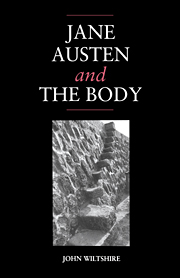Book contents
- Frontmatter
- Contents
- Acknowledgements
- A note on texts
- Introduction: Jane Austen and the body
- 1 Sense, sensibility and the proofs of affection
- 2 ‘Eloquent blood’: the coming out of Fanny Price
- 3 Emma: the picture of health
- 4 Persuasion: the pathology of everyday life
- 5 Sanditon: the enjoyments of invalidism
- Notes
- Bibliography
- Index
2 - ‘Eloquent blood’: the coming out of Fanny Price
Published online by Cambridge University Press: 11 November 2009
- Frontmatter
- Contents
- Acknowledgements
- A note on texts
- Introduction: Jane Austen and the body
- 1 Sense, sensibility and the proofs of affection
- 2 ‘Eloquent blood’: the coming out of Fanny Price
- 3 Emma: the picture of health
- 4 Persuasion: the pathology of everyday life
- 5 Sanditon: the enjoyments of invalidism
- Notes
- Bibliography
- Index
Summary
‘Miss Catherine is put upon the Shelve for the present, and I do not know that she will ever come out’, Jane Austen told her niece, Fanny Knight, who had enquired about the fate of the manuscript later published by her brother and known to us as Northanger Abbey. The phrase is perhaps in the nature of a pun, for ‘coming out’ in the sense of ‘a young lady's entrance into the world’, to borrow the subtitle of Burney's Evelina, is very much at issue in Northanger Abbey, which shows the seventeen year old country girl Catherine Morland being introduced into the society of Bath.
The phrase ‘the world’, like ‘coming out’, is resonant with multiple possibilities. In one of the very first dialogues of Mansfield Park a discussion takes place which invites us to consider the destiny of its much less robust young heroine in this light, or rather under the multiple lights and headings the phrase brings together. ‘Pray, is she out, or is she not?’ asks Mary Crawford of ‘Miss Price’: ‘She dined at the parsonage, with the rest of you, which seemed like being out; and yet she says so little, that I can hardly suppose she is’ (48) and her question gives rise to a lively discussion about the conversational manners to be found among young women who are or who are not ‘out’. The question evidently bears upon both Fanny's maturity and her social status.
- Type
- Chapter
- Information
- Jane Austen and the Body'The Picture of Health', pp. 62 - 109Publisher: Cambridge University PressPrint publication year: 1992
- 1
- Cited by



